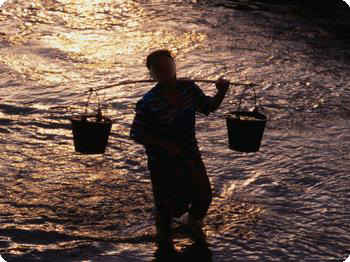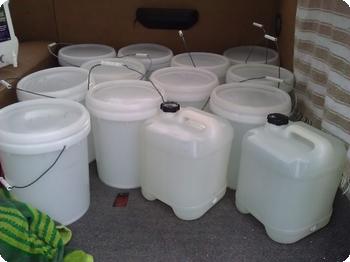You are here: Home  News NewsBuckets, Water, Knowledge and Learning and the Art of Thinking Big: Part 1 Posted on Saturday, November 17, 2012 Now, imagine three people, Abdullah, Zaid and Amr. They are going to collect water. So Abdullah takes his bucket (holds 3 litres), Zaid takes a sturdy wooden stick at each end of which are are two large buckets tied by ropes, each able to hold about 10 litres. Then we have Amr, he, comes with a wheelbarrow containing around a dozen (12) or so buckets which can each hold around 10 litres.
Now, who is going to come back with the most water? Of course it is Amr, upon the principle, "The one with the most buckets takes the most water." So what's the reason here. Well its because Amr is a bigger thinker than Zaid who is a bigger thinker than Abdullaah. You see small and short-sighted thinkers only get in accordance with their vision. Hence, Abdullah will collect 3 litres. Zaid will collect 20 litres and Amr will collect a whopping 120 litres or so. But its not just about thinking big. It's all about organization and having the tools. So you can see that Zaid is more organized (in both his mind and practically) than Abdullah. And Amr is a man who thinks big, is organized and is practically well-prepared. So we see here that there are three qualities we need to focus on: 1) thinking big, 2) good organization, and 3) useful practical tools. So how does this relate to learning. Well, its exactly the same, there is no difference. Let's change our parable slightly and lets say knowledge was actually water and water was distributed at the classroom or the mosque. Now what is taking place at the classroom and the mosque is the "collection" or "acquisition" of water and how much is collected or acquired obviously comes down to whatever preparations each person has made in advance and the efficiency of whatever tools he is employing. This now brings us to learning a language and Arabic in particular, and we want to benefit from this parable of buckets. What we learned from this parable is that there is a stage before the actual collection or acquisition of water (i.e. knowledge, understanding), and it is this preparation stage which actually plays a large role the efficiency of collection. So what is this stage and how does one establish it? Well it depends on the nature of what is being learned and will vary in each case. You would prepare differently if you were collecting pineapples instead of water, for example. So the preparation varies based upon what it is you are learning. In our discussion it is the Arabic language in particular, and when speak of buckets, we mean mental buckets, buckets that you set up in your mind. So in the case of Arabic (or in fact most other types of knowledge) we set up buckets in the form of frameworks into which we will be able place and position things in a way that they make sense, are meaningful, and allow us to always see "the whole" instead of being lost in "the parts". This has the effect that as we receive knowledge (water) we already have a specific bucket reserved for that particular type or piece of knowledge and that specific bucket is laid out in a scheme (in the mind), in a specific way in relation to all other buckets, so as knowledge comes in, it is immediately put in the correct place in the overall scheme of things - so "understanding" (fiqh) is produced instantly, as in we know exactly what we are doing, and we know the significance of the incoming knowledge immediately in the overall scheme of things. To be continued...
Related search terms:
learning arabic online,
mastering arabic.
Link to this news item: Show: HTML Link • Full Link • Short Link |
And Receive Tips and Tricks to Improve Your Arabic! 
|
|
The moment you have completed working with our application form your apply gets reviewed and you receive a positive answer.
|












